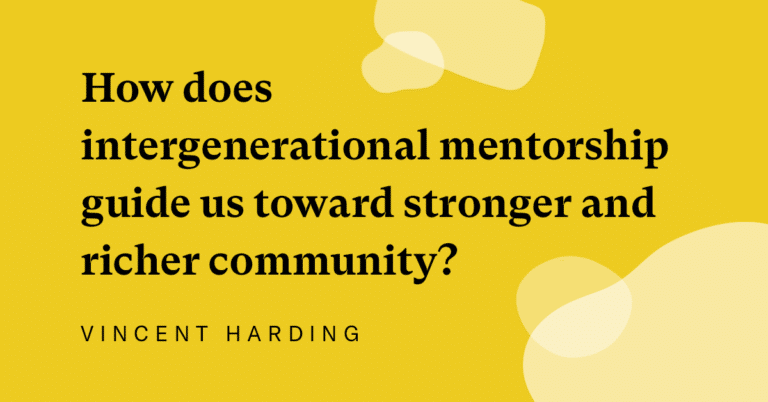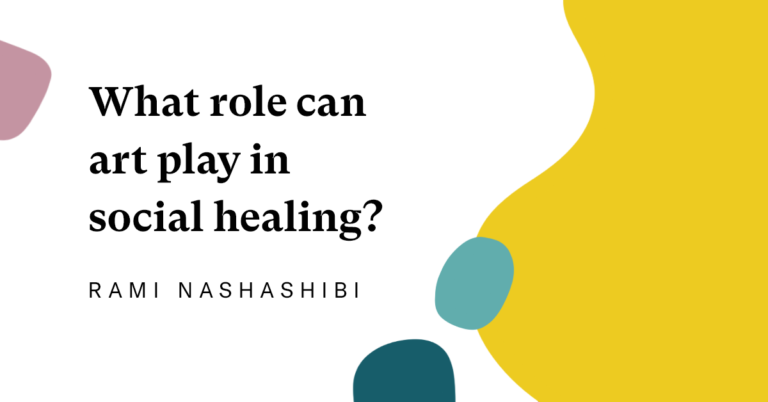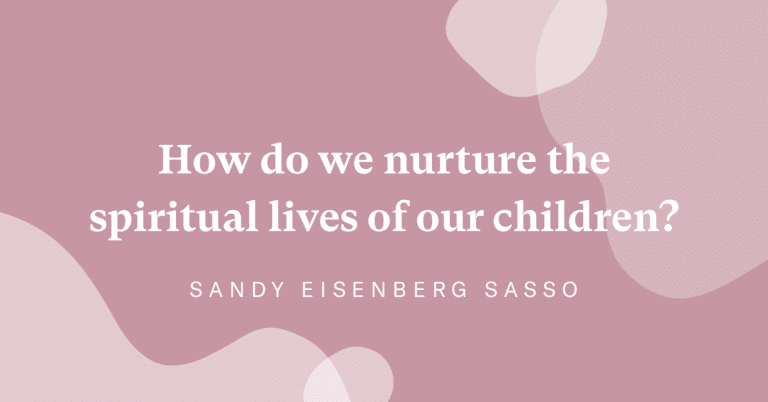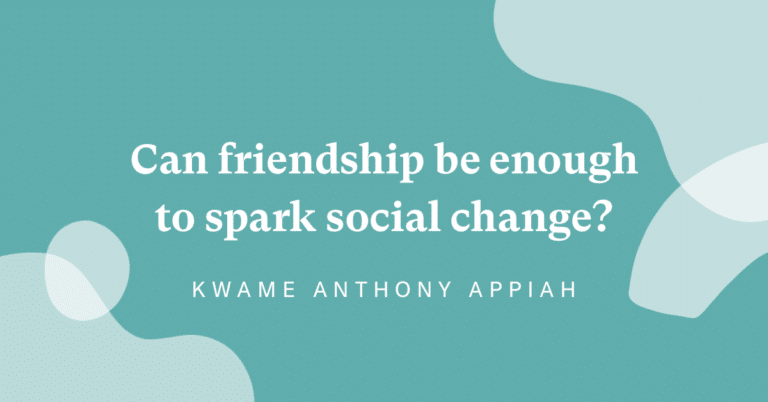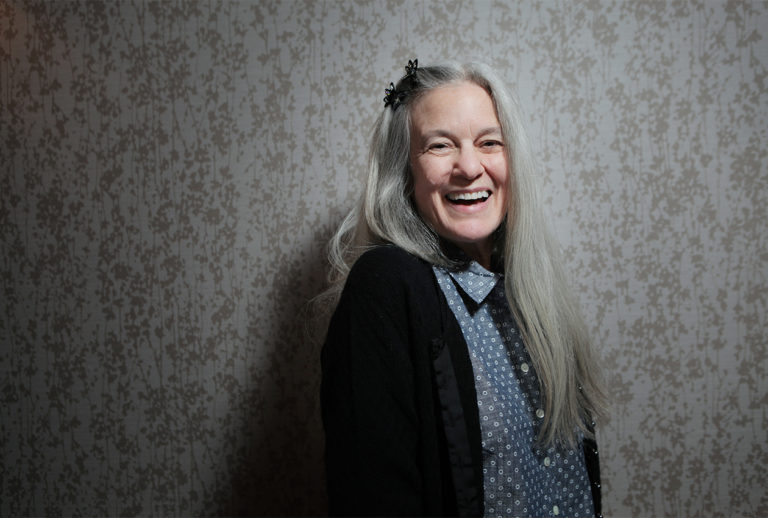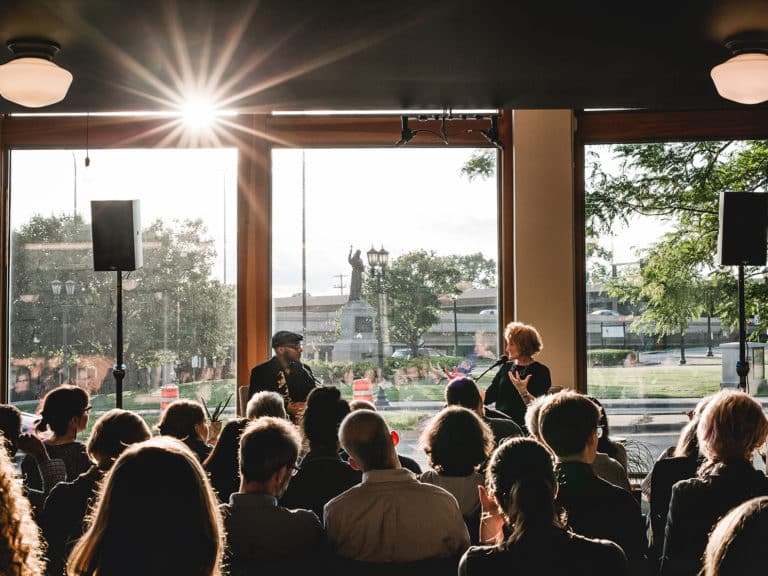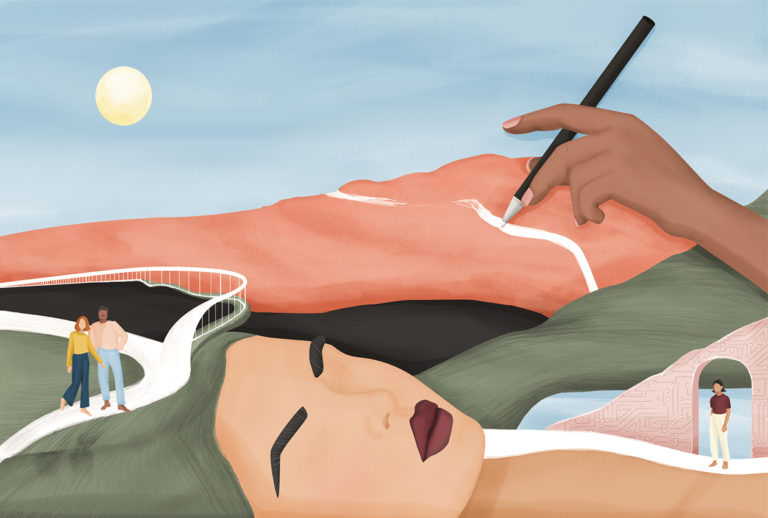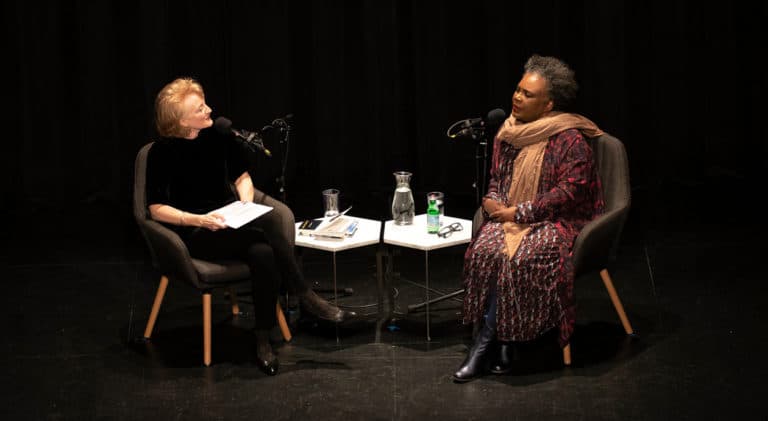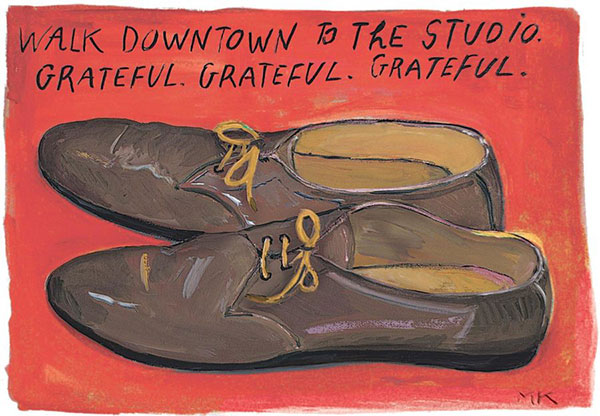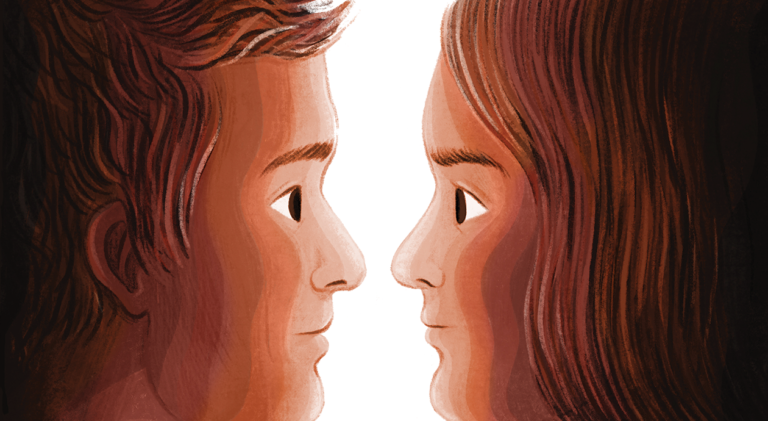A civil rights elder and speechwriter for Martin Luther King, Jr., the late Vincent Harding brought the wisdom of the movement to young people in hurting places. He offers the image of a “live human signpost” as a guiding light toward the kind of support and mentorship we can offer one another in the path toward a beloved community. “When it comes to creating a multiracial, multiethnic, multireligious, democratic society, we are still a developing nation,” he says. “But my own deep, deep conviction is that the knowledge, like all knowledge, is available to us if we seek it.”
On Being with Krista Tippett
View
- List View
- Standard View
- Grid View
510 Results
May 6, 2019
Rami Nashashibi
Art and Justice Work Together
Rami Nashashibi is a champion for how art can make humans visible to each other. He brings a new energy to Islam’s core commitment to beauty and humanity — and to the power of stories to heal and electrify us across geography and generation, culture and faith. He founded the Inner-City Muslim Action Network on Chicago’s South Side, where he also lives with his family. “The arts have become the real factor for us in both humanizing each other’s stories, connecting our stories, and revealing to one another the possibilities of what a better world can look like,” he says.
April 29, 2019
Sandy Eisenberg Sasso
Nurturing Our Children’s Souls
A rabbi and parent, Sandy Eisenberg Sasso wants us to think about how we might teach our children’s souls, not just their minds. She says nurturing the spiritual lives of our children is the work of understanding for ourselves “what really matters in life, what’s precious, what’s more important than earning a living and going through our daily routine.”
April 25, 2019
Joanna Macy
A Wild Love for the World
A Buddhist philosopher of ecology, Joanna Macy says we are at a pivotal moment in history with the possibility to unravel or create a life-sustaining human society. Now entering her 90s, Macy has lived adventurously by any definition. She worked with the CIA in Cold War Europe and the Peace Corps in post-colonial India and was an early environmental activist. She brings a poetic and spiritual sensibility to her work that’s reflected in her translations of the early-20th-century poet Rainer Maria Rilke. We take that poetry as a lens on her wisdom on the great dramas of our time: ecological, political, personal.
April 18, 2019
Wangari Maathai
Marching with Trees
The late Wangari Maathai was a biologist, environmentalist, and the first African woman to win a Nobel Peace Prize. She was born under British colonial occupation and schooled by Catholic missionaries. But when she looked back on her childhood near the end of her life, she realized her family’s Kikuyu culture had imparted her with an intuitive sense of environmental balance. Maathai was steadfast in her determination to fight for the twin issues of conservation and human rights — and planting trees was a symbol of defiance.
April 15, 2019
Kwame Anthony Appiah
Friendship and the Democratic Process
Philosopher Kwame Anthony Appiah offers hope for quiet, sustained culture shift through the “endless shared conversation” of friendship. The writer of the New York Times “Ethicist” column studies how deep social change happens across time and cultures. “If you have that background of relationship between individuals and communities that is conversational, then when you have to talk about the things that do divide you, you have a better platform.”
April 4, 2019
Maya Angelou, Elizabeth Alexander, and Arnold Rampersad
W.E.B. Du Bois and the American Soul
A prolific writer on sociology, history, economics, and politics, W.E.B. Du Bois was one of the most extraordinary minds of American and global history. His life traced an incredible arc; he was born three years after the end of the Civil War and died on the eve of the March on Washington. In 1903, he penned the famous line that “the problem of the 20th century is the problem of the color line.” Du Bois was a formative voice for many of the people who gave us the civil rights movement and for all of us navigating the still-unfolding, unfinished business of racial justice now. We bring his life and ideas into relief through three conversations with people who were inspired by him.
March 28, 2019
Desmond Tutu, Natalie Batalha, Eckhart Tolle, et al.
‘Becoming Wise’ With Tools for the Art of Living
Over the years, listeners have asked for short-form distillations of On Being — something to listen to while making a cup of tea. Our podcast Becoming Wise is this offering, designed to help you reset your day and replenish your sense of yourself and the world, ten minutes at a time. A taste of the new season, curated from hundreds of big conversations Krista has had with wise and graceful lives — including Archbishop Desmond Tutu, astronomer Natalie Batalha, and spiritual teacher Eckhart Tolle.
March 21, 2019
Lawrence Kushner
Kabbalah and Everyday Mysticism
Rabbi Lawrence Kushner is a long-time student and articulator of the mysteries and messages of Kabbalah, the Jewish mystical tradition. Kushner says mysticism tends to appear when religion — whatever the tradition — becomes too formal and logical. “The minute mysticism becomes permissible, acceptable, possible, it’s an immediate threat to organized religious structures,” he says. “Because what mysticism does is it gives everybody direct unmediated personal access to God.” He is influenced by the Jewish historian Gershom Scholem, who resurrected Kabbalah from obscurity in the 20th century and made it accessible to modern people.
March 14, 2019
Sharon Olds
Odes to the *****
When the wise and whimsical Sharon Olds started writing poetry over 40 years ago, she explored the subjects that interested her most — like diaphragms. “The politeness and the prudity of the world I grew up in meant that there were things that were important to me and interesting to me, [but] I had never read a poem about,” she once said. She won the Pulitzer Prize in 2013 for her collection Stag’s Leap about walking through the end of a long marriage. Her most recent book, Odes, pays homage to the human body and experience.
March 7, 2019
Jean Vanier
The Wisdom of Tenderness
Editor’s note: In February 2020, L’Arche International released the results of an independent investigation that it commissioned into Jean Vanier, who died in 2019. The investigation determined that the L’Arche founder, Catholic philosopher and humanitarian engaged in manipulative sexual relationships with at least six women from 1970-2005. None of the women had disabilities. The report also concluded that Vanier was complicit in covering up similar sexual abuse by his mentor, the late Father Thomas Philippe. In this response, Krista reflects on the moral questions and meaning raised by these discoveries.
A philosopher and Catholic social innovator, Jean Vanier is one of the great elders in our world today. The L’Arche movement, which he founded, centers around people with mental disabilities. The dozens of L’Arche communities around the world have become places of pilgrimage and are transformative for those involved and for the world around them. He has devoted his life to the practical application of Christianity’s most paradoxical teachings — that there’s power in humility, strength in weakness, and light in the darkness of human existence.
February 28, 2019
Teju Cole
Sitting Together in the Dark
Writer and photographer Teju Cole says he is “intrigued by the continuity of places, by the singing line that connects them all.” He attends to the border, overlap and interplay of things — from Brahms and Baldwin to daily technologies like Google. To delve into his mind and his multiple arts is to meet this world with creative raw materials for enduring truth and quiet hope.
February 14, 2019
Richard Davidson
A Neuroscientist on Love and Learning
Neuroscientist Richard Davidson is one of the central people who’s helped us begin to see inside our brains. His work has illuminated the rich interplay between things we saw as separate not that long ago: body, mind, spirit, emotion, behavior, and genetics. Richard is applying what he’s learning about imparting qualities of character — like kindness and practical love — in lives and in classrooms. This live conversation was recorded at the Orange County Department of Education in Costa Mesa, California.
February 7, 2019
Maria Popova
Cartographer of Meaning in a Digital Age
She has called Brain Pickings, her invention and labor of love, a “human-powered discovery engine for interestingness.” What Maria Popova really delivers, to hundreds of thousands of people each day, is wisdom of the old-fashioned sort, presented in new ways. She cross-pollinates between philosophy and design, physics and poetry, the intellectual and the experiential. We explore her gleanings on what it means to lead a good life — intellectually, creatively, and spiritually.
The poet, essayist, and playwright Claudia Rankine says every conversation about race doesn’t need to be about racism. But she says all of us — and especially white people — need to find a way to talk about it, even when it gets uncomfortable. Her bestselling book, Citizen: An American Lyric, catalogued the painful daily experiences of lived racism for people of color. Claudia models how it’s possible to bring that reality into the open — not to fight, but to draw closer. And she shows how we can do this with everyone, from our intimate friends to strangers on airplanes.
January 3, 2019
Maira Kalman
Daily Things to Fall in Love With
Writer and illustrator Maira Kalman is well known for her books for children and adults, her love of dogs, and her New Yorker covers. Her words and pictures bring life’s intrinsic quirkiness and whimsy into relief right alongside life’s intrinsic seriousness. As a storyteller, she is contemplative and inspired by the stuff of daily life — from fluffy white meringues to well-worn chairs. “There’s never a lack of things to look at,” she says. “And there’s never a lack of time not to talk.”
December 20, 2018
Walter Brueggemann
The Prophetic Imagination
Walter Brueggemann is one of the world’s great teachers about the prophets who both anchor the Hebrew Bible and have transcended it across history. He translates their imagination from the chaos of ancient times to our own. He somehow also embodies this tradition’s fearless truth-telling together with fierce hope — and how it conveys ideas with disarming language. “The task is reframing,” he says, “so that we can re-experience the social realities that are right in front of us, from a different angle.”
December 6, 2018
Rebecca Traister and Avi Klein
#MeToo Through a Solutions Lens
What we are naming with the impetus of #MeToo is, at best, an opening to a long-term cultural reckoning to grow up humanity; to make our society more whole. We explore this with psychotherapist Avi Klein, who works with men and couples, and feminist journalist Rebecca Traister. In a room full of journalists, at the invitation of the Solutions Journalism Network, we explored how to build the spaces, the imaginative muscle, and the pragmatic forms to support healing for women and men, now and in time.
The Pause
Join our constellation of listening and living.
The Pause is a monthly Saturday morning companion to all things On Being, with heads-up on new episodes, special offerings, event invitations, recommendations, and reflections from Krista all year round.
Search results for “”
View
- List View
- Standard View
- Grid View
Filters





